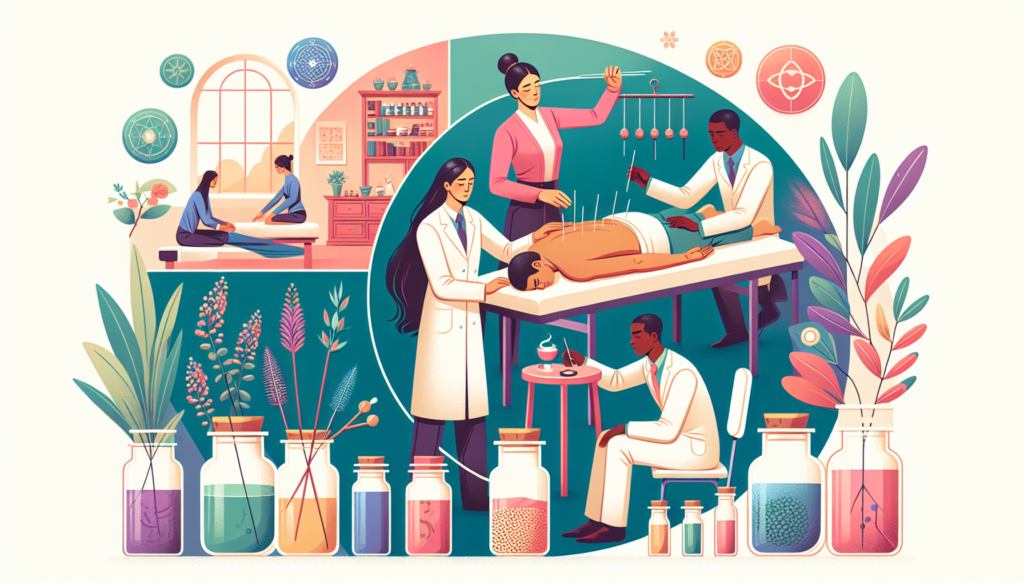Are you curious about the safety of alternative medicine practices? In a world where traditional medical treatments are the norm, it’s natural to wonder about the potential risks and benefits of alternative approaches. This article aims to shed light on the safety aspects of alternative medicine, addressing common concerns and exploring the research behind these practices. By the end, you’ll feel more informed and empowered to make choices that align with your personal well-being.

Understanding Alternative Medicine
Defining alternative medicine
Alternative medicine refers to a range of medical practices that fall outside the realm of conventional Western medicine. It encompasses various healing methods, therapies, and treatments that are not typically taught in medical schools or endorsed by regulatory bodies. Alternative medicine aims to treat and prevent diseases through natural, non-invasive approaches, focusing on the whole person rather than just the symptoms. It includes practices like acupuncture, herbal medicine, chiropractic treatment, homeopathy, and many others.
Different types of alternative medicine
Alternative medicine can be categorized into several broad types, each with its unique principles and approaches. Some of the most commonly recognized types of alternative medicine include:
-
Traditional Chinese Medicine (TCM): Based on ancient Chinese theories, TCM focuses on restoring the balance of energy or “qi” in the body through practices like acupuncture, herbal medicine, and tai chi.
-
Ayurvedic Medicine: Originating from India, Ayurvedic medicine emphasizes the harmony between mind, body, and spirit, utilizing herbs, yoga, meditation, and dietary modifications to promote health and well-being.
-
Naturopathy: This approach focuses on supporting the body’s natural healing abilities through lifestyle modifications, nutrition, herbal supplements, and physical therapies.
-
Homeopathy: Homeopathic remedies are prepared from highly diluted substances and aim to activate the body’s self-healing capabilities. It follows the principle of “like cures like,” meaning that a substance that causes symptoms in a healthy person can be used to treat similar symptoms in a sick individual.
Popularity of alternative medicine
In recent years, alternative medicine has been increasingly embraced by individuals seeking more personalized and holistic approaches to health and wellness. The rising popularity can be attributed to various factors. Many individuals feel dissatisfied with the side effects, invasiveness, or high costs associated with conventional medicine. Others are drawn to alternative medicine’s focus on preventive care, patient empowerment, and natural therapies. Additionally, the internet has played a significant role in spreading awareness and facilitating access to alternative medicine practices. However, it is essential to understand the potential safety concerns and limitations associated with alternative medicine before fully embracing it as a primary healthcare choice.
Safety Concerns with Alternative Medicine
Lack of regulation and standardization
One of the main safety concerns associated with alternative medicine is the lack of regulation and standardization across different practices. Unlike conventional medicine, which must meet rigorous scientific and regulatory standards, alternative medicine practices often lack similar oversight. As a result, the quality and safety of herbal supplements, treatments, and therapies can vary widely. It is crucial to be cautious when considering alternative medicine and to gather as much information as possible about the practitioner, their qualifications, and the specific practices they employ.
Limited scientific evidence
Another safety concern lies in the limited scientific evidence supporting the effectiveness and safety of many alternative medicine practices. While some alternative therapies have been the subject of rigorous scientific studies, others rely more on anecdotal evidence or traditional wisdom. Without well-designed clinical trials, it can be challenging to determine the true benefits and potential risks of certain alternative treatments. Additionally, the lack of standardized research methodologies and guidelines in alternative medicine makes it harder to establish consistent results and draw definitive conclusions.
Potential risks and side effects
While alternative medicine generally promotes natural healing, it is not without potential risks and side effects. Herbal supplements, for example, can interact with prescription medications, exacerbating certain health conditions or diminishing the effectiveness of conventional treatments. Some alternative therapies, such as spinal manipulation in chiropractic treatment, may pose risks of injury if not performed correctly. Moreover, herbal preparations can cause allergic reactions and sensitivities in some individuals. Contamination and adulteration of herbal products can also occur, highlighting the need for caution when selecting and using alternative medicine options.
The Importance of Research
Research on effectiveness
To ensure the safety and efficacy of alternative medicine practices, rigorous scientific research is essential. Conducting well-designed studies can help determine whether certain alternative therapies actually produce the desired effects and provide measurable benefits. By comparing alternative medicine treatments to placebos or standard treatments, researchers can evaluate their true effectiveness. Robust research can also identify any potential harms or risks associated with specific alternative therapies, informing both practitioners and patients about the best course of action.
Research on safety
To address the safety concerns associated with alternative medicine, it is crucial to conduct research focused specifically on identifying potential risks and adverse effects. Through comprehensive safety studies, researchers can determine the likelihood and severity of adverse events associated with various alternative treatments. This information is paramount in making informed decisions about the safety of alternative medicine and in providing accurate guidance to healthcare professionals and patients.
Comparisons to conventional medicine
Research comparing alternative medicine to conventional medical treatments is of great importance. By comparing the effectiveness, safety, and cost-effectiveness of different approaches, researchers can provide valuable insights into when alternative medicine may be an appropriate adjunct or alternative to conventional treatments. Such studies are critical for healthcare providers and patients alike, helping them make informed choices regarding their healthcare options.
Potential Interactions and Risks
Interactions with prescription drugs
One significant concern when considering alternative medicine is the potential for interactions between alternative therapies and prescription medications. Herbal supplements, for example, can interact with drugs, either enhancing or diminishing their effects. These interactions can lead to unexpected side effects, reduced efficacy of medications, or even life-threatening situations. It is essential to inform healthcare providers about any alternative therapies you are using to avoid potentially harmful interactions.
Allergic reactions and sensitivities
Alternative medicine practices, particularly those involving herbal remedies, carry the risk of allergic reactions and sensitivities. Some individuals may develop allergies or adverse reactions to specific herbs or their components. Proper identification of allergies and sensitivities is crucial to avoid potential harm. Consulting with a healthcare professional or allergist can help determine any potential risks associated with using alternative medicine treatments.
Contamination and adulteration
Another concern with alternative medicine is the potential for contamination and adulteration of herbal products. Unlike regulated pharmaceuticals, herbal supplements are not subject to the same stringent quality control measures. This can lead to the presence of impurities, undisclosed ingredients, or incorrect dosages in herbal preparations. It is essential to choose reliable and reputable suppliers or consult with healthcare professionals who can advise on the quality and safety of alternative medicine products.

Healthcare Provider’s Role
Communication with healthcare providers
Open and honest communication between patients and healthcare providers is paramount when considering alternative medicine. Patients should inform their healthcare providers about any alternative therapies they are using or considering. This allows healthcare providers to have a complete understanding of a patient’s treatment regimen and consider potential interactions or risks associated with alternative medicine approaches. Likewise, healthcare providers should actively inquire about their patients’ usage of alternative medicine to provide appropriate guidance and ensure safe and coordinated care.
Combining alternative medicine with conventional treatments
In some cases, alternative medicine can be used alongside conventional medical treatments, as part of a comprehensive approach to healthcare. When considering combining these two approaches, it is crucial to involve healthcare providers in the decision-making process. They can help assess potential interactions, evaluate the evidence and safety of alternative therapies, and provide guidance on integrating alternative medicine into existing treatment plans. Collaboration between patients, healthcare providers, and alternative medicine practitioners fosters a cooperative approach that prioritizes patient safety and well-being.
Educating patients about risks
Healthcare providers play a vital role in educating patients about the potential risks and limitations of alternative medicine. By providing evidence-based information and engaging in open conversations, healthcare providers can empower patients to make informed decisions regarding their healthcare. It is essential to create an environment where patients feel comfortable asking questions and discussing their interest in alternative medicine, allowing for comprehensive and holistic care.
Alternative Medicine for Specific Conditions
Pain management
Alternative medicine offers various approaches to pain management, particularly for chronic pain conditions. Techniques such as acupuncture, massage therapy, and herbal remedies have shown potential in reducing pain and improving quality of life for many individuals. However, it is crucial to consult with healthcare providers to assess the suitability and safety of alternative therapies for specific pain conditions. A collaborative approach that combines alternative and conventional treatments may offer the most effective pain management strategies.
Chronic illnesses
Alternative medicine can also be considered for managing chronic illnesses such as cardiovascular disease, diabetes, and autoimmune disorders. Lifestyle modifications, dietary changes, and stress reduction techniques, commonly employed in alternative medicine, may complement traditional treatments and help improve overall health outcomes. However, the effectiveness and safety of alternative medicine for chronic illnesses should be carefully evaluated on an individual basis, considering the specific condition and the body of evidence available.
Mental health
Alternative medicine approaches can be beneficial in managing mental health conditions such as anxiety, depression, and stress-related disorders. Techniques including mindfulness-based practices, yoga, and aromatherapy have shown promise in reducing symptoms and improving emotional well-being. It is crucial, though, to approach alternative mental health treatments with caution and under the guidance of mental healthcare professionals. A comprehensive treatment plan that integrates alternative medicine with evidence-based therapies can offer a holistic approach to mental health care.

Evidence-based Alternative Medicine
Promoting evidence-based practices
Promoting evidence-based practices is essential for ensuring the safety and effectiveness of alternative medicine. Integrating alternative medicine into the scientific research framework allows for rigorous evaluation of different therapies and treatments. Encouraging practitioners to adhere to evidence-based guidelines promotes transparency, reliability, and responsible use of alternative medicine.
Importance of professional guidance
Seeking professional guidance from qualified healthcare providers or practitioners trained in alternative medicine is crucial when considering alternative therapies. They can provide evidence-based information, offer guidance on treatment options, and help individuals navigate the complex landscape of alternative medicine. The expertise of healthcare professionals ensures that individual health needs and safety considerations are appropriately addressed.
Recognizing pseudoscience
While alternative medicine encompasses many valid and effective practices, it is important to be aware of pseudoscience and questionable treatments. Pseudoscience refers to practices that lack scientific evidence or are based on faulty reasoning. Consumers should be vigilant and skeptical of claims that sound too good to be true, rely solely on anecdotal evidence, or lack scientific support. Recognizing pseudoscience is essential for making informed decisions about alternative medicine and prioritizing evidence-based healthcare practices.
Consumer Responsibility
Understanding the risks and limitations
Consumers have a responsibility to fully understand the risks and limitations associated with alternative medicine. This includes recognizing that alternative medicine practices may not be suitable for all health conditions or individuals. It is important to maintain realistic expectations and acknowledge that alternative medicine may not always provide a cure or complete resolution of symptoms. By understanding the potential risks, consumers can make informed decisions that prioritize their safety and well-being.
Researching alternative therapies
Thorough research is crucial when considering alternative therapies. Consumers should gather information from reputable sources, such as scientific journals, government health agencies, or trustworthy healthcare providers. Evaluating the available evidence and assessing the quality and reliability of sources can help consumers make well-informed decisions about alternative medicine treatments. Additionally, consulting with healthcare professionals who are knowledgeable about alternative medicine can provide valuable guidance and insights.
Seeking advice from qualified professionals
When considering alternative medicine, seeking advice from qualified professionals is crucial. Healthcare providers, such as integrative medicine physicians or licensed naturopathic doctors, can provide expert guidance, evaluate the evidence for different alternative therapies, and help individuals navigate the complexities of alternative medicine. Professionals with appropriate training and credentials ensure that individuals receive the safest and most effective alternative medicine treatments.

Alternative Medicine in Combination with Conventional Treatment
Complementary and integrative medicine
The integration of alternative medicine with conventional medical treatments is commonly referred to as complementary and integrative medicine. Complementary medicine refers to therapies or treatments used alongside conventional medicine to enhance its effects or alleviate side effects. Integrative medicine takes a collaborative approach, combining the best of both conventional and alternative medicine to create a comprehensive healthcare plan. Utilizing alternative therapies alongside conventional treatments can enhance patient outcomes and improve overall well-being.
Potential benefits of a combined approach
A combined approach to healthcare has the potential to offer numerous benefits for patients. By integrating alternative medicine, patients may experience improved symptom management, enhanced treatment response, and reduced side effects of conventional treatments. Additionally, the holistic nature of alternative medicine can address the overall well-being and quality of life aspects that may be overlooked by conventional treatments alone. Through a collaborative effort, healthcare providers can tailor treatment plans to individual needs, offering the most effective and comprehensive care possible.
Collaboration between alternative and conventional practitioners
Collaboration between practitioners of alternative and conventional medicine is essential for ensuring patient safety and optimizing treatment outcomes. Open lines of communication and shared decision-making between healthcare providers of different disciplines create an integrated approach that benefits the patient. By collaborating, healthcare professionals can avoid potential interactions or conflicts between different treatments, provide comprehensive patient education, and foster a coordinated and patient-centered healthcare experience.
Future Perspectives
Advancements in research
The future of alternative medicine lies in advancements in research and increasing scientific scrutiny. Ongoing research efforts are essential for understanding the safety, efficacy, and potential applications of different alternative medicine practices. Conducting large-scale, well-designed clinical trials and publishing findings in reputable journals can help establish a stronger evidence base and inform healthcare decisions.
Integration of alternative medicine into healthcare systems
As the popularity of alternative medicine continues to grow, there is increasing recognition of the need to integrate it into mainstream healthcare systems. Efforts are being made to incorporate alternative medicine into academic curricula, establish regulatory standards, and create guidelines for healthcare providers. Integrating alternative medicine into healthcare systems can improve patient access, ensure appropriate regulation, and foster a more comprehensive and patient-centered approach to care.
Balancing safety and accessibility
As alternative medicine becomes more mainstream, striking a balance between safety and accessibility is crucial. While rigorous regulation is necessary to ensure patient safety, excessive regulation can limit access to alternative therapies that may be beneficial for certain individuals. Finding the right balance between safety measures and patient autonomy is essential to ensure that alternative medicine remains accessible to those who choose it while minimizing potential harms.
In summary, alternative medicine offers a range of therapies and treatments outside the realm of conventional Western medicine. While it is important to recognize the popularity and potential benefits of alternative medicine, it is equally essential to be aware of the safety concerns and limitations associated with these practices. Research, professional guidance, and open communication with healthcare providers are key in making informed decisions about alternative medicine and achieving a balanced approach to healthcare. By considering evidence-based practices, understanding potential interactions and risks, and seeking qualified advice, individuals can safely navigate the world of alternative medicine and make choices that prioritize their well-being.



